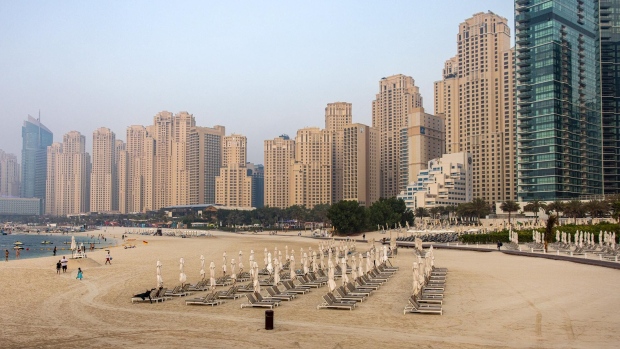Nov 6, 2023
Russians Lose Taste for Suddenly Pricey Dubai Property
, Bloomberg News

(Bloomberg) -- The Russian property boom in Dubai appears to be over.
Russian purchases of Dubai real estate have been slowing down over the last few months, brokers say, after a year in which the ruble lost a third of its value. Meanwhile, there’s a natural ebb after a flurry of buying in the year after the Ukraine invasion, according to the brokers, and some Russians who have resettled here decided Dubai just wasn’t for them and have moved on.
Russians traditionally been fans of United Arab Emirates property, but they really flooded into the market in 2022, after international sanctions squeezed Russia’s economy and finances after the country’s invasion of Ukraine. They were part of a post-pandemic market boom that’s pushed home prices up about 30% in the past two years to September, according to CBRE Group Inc.
One luxury broker says Russians have become net sellers at his firm, repatriating money after big gains in the emirate’s red-hot property market or getting out of deals they can no longer afford.
“They’re taking profits,” said Abdullah Al Ajaji, founder of Driven Properties, whose Russian clients bought 146.5 million dirhams’ ($39.9 million) worth of real estate in June through August and sold 276 million dirhams’ worth in the same period.
The buying by Russians continued into the first half of 2023, according to Emaar Properties PJSC, Dubai's biggest developer.
- Read More: Dubai Cements Status as World’s Busiest Luxury Property Market
Then, a pullback started showing up over the past few months, when brokers say they were seeing fewer buyers with Russian passports—or those from proxy countries, such as Cyprus, St. Kitts or Malta. Brokerage Betterhomes says that Russians were the agency’s fifth-largest foreign buyer of residential property in Dubai in the third quarter of 2023, down from No. 1 during the same quarter last year, by volume of transactions. It was the first time since the second quarter of 2022 that Russians dropped below the top three for Betterhomes.
In particular, it’s the luxury end of the spectrum that is feeling the fallout the most.
“Russians, they used to buy high-ticket [properties] last year,” said Arash Jalili, CEO of Dubai-based brokerage Unique Properties. “They were not questioning: $10 million, $15 million whatever. They were buying. But now, that tier—they're not buying anymore.”
Jalili estimates the number of transactions at his firm by Russians has fallen 15%—but the value of those transactions has fallen 50%.
The waning interest from Russians has been buffeted by increased buying by people from elsewhere in the world, brokers say. Al Ajaji says he’s seeing more Europeans, Americans, Chinese and people coming from Singapore interested in purchasing property in the UAE, for tax and safety reasons. Indians and Brits have continued their traditional role as top buyers, while Chinese buyers have been returning to the market post-pandemic.
Oleg Torbosov, founder of real-estate brokerage Whitewill, opened his real-estate brokerage in Moscow in 2016 and expanded to Dubai in March 2021, a year before the invasion of Ukraine. Torbosov says Russian buyers have been heavily interested in beachfront property in Dubai like Atlantis the Royal—the ultra-luxury new hotel and residences that was opened earlier this year by Beyoncé—and Bluewaters Island, an artificial island that’s home to shops, a non-functioning Ferris wheel and luxury apartments where Russian accents are now commonplace. Torbosov says a common joke these days is that you now need a Russian visa to go to Bluewaters.
In 2022, buyers rushed to buy apartments in the luxurious Bluewaters developments that were ready to move into, sending prices soaring 41% in the year to June 2023, according to CBRE per-square-foot data. That’s when, Russian buyers became Torbosov’s top clients in Dubai, overtaking British and Indian nationals.
Now, prices have been tapering. Apartment prices in Bluewaters, including those still under construction, went from up 23.8% in the first quarter of 2023 to up only 10.2% in the third quarter, according to data from Knight Frank. And Russians have slipped to the ninth-largest client for Whitewill—despite the firm’s heavy clientele of clients from Russia and the former Soviet states.
“There are several reasons,” he said, sitting in between meetings at the DRVN by Porsche café on the artificial island. “First, people who have money already bought last year.” In other words, it’s a natural slowdown in demand. He also says some Russian banks have independently curtailed risk, cutting off certain money-transfer services to all but their top clients or restricting the monthly amount that can be sent.
Some Russian buyers are trying to get out of deals when the final set of payments are suddenly much larger than they expected. In fast-growing Dubai, people commonly put money down—10% to 20%—on properties before construction starts. Russian clients who bought three or four pre-construction units who can still turn a profit on their stakes are trying to sell them on, Jalili says. In some cases, Russians have been selling those holdings at a loss or, even, defaulting, Al Ajaji says.
Someone who made a 10% down payment on a $10 million property a year ago might have expected to have to bring over $9 million more from Moscow, or 54 million rubles. Now, the same remaining principal would cost about 83 million rubles. Meanwhile, brokers say they’ve seen some Russians repatriating money to invest into businesses at home.
- Read More: Hundreds of Buyers Queue Up for Dubai's $5 Million Palm-Island Homes
Torbosov says his Russian clients in that situation can’t find buyers easily without taking a loss. “If it’s not a completed building, it’s very difficult to sell,” he says.
©2023 Bloomberg L.P.





